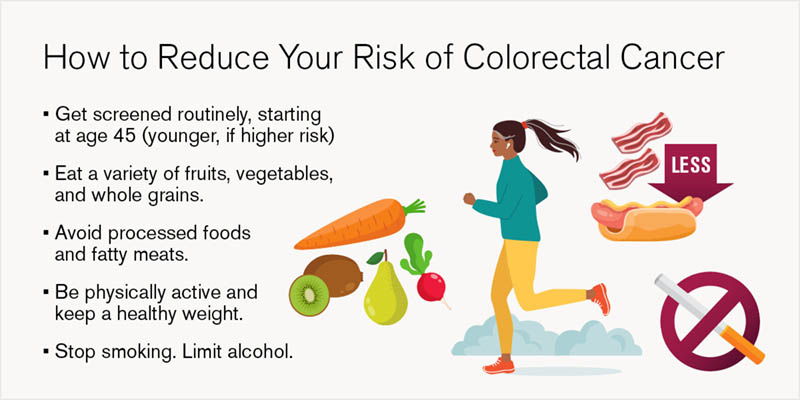10 Facts You Need to Know About Colon Cancer
June 13, 2024
Categories: Colorectal Cancer, Cancer Care
 By Marc Singer, MD, Colon & Rectal Surgery
By Marc Singer, MD, Colon & Rectal Surgery
Whether you're concerned about colorectal cancer because it runs in your family or you're turning 45 and you've heard it's time for a colonoscopy, getting screened for colon cancer can be a life-saving decision.
Colon cancer has also been traditionally associated with older age groups, but recent trends show a concerning increase in younger populations, including individuals under 50. This shift has prompted medical professionals to reconsider screening guidelines and emphasize the importance of early detection.

Following are 10 key facts you need to know about colorectal cancer, screenings and tests, and ways to lower your risk of developing this disease:
Fact #1: Colorectal cancer is the second-leading cause of cancer-related deaths in men and women in the United States
The Center for Disease Control (CDC) and the American Cancer Society estimate that more than 50,000 Americans die from colon cancer each year – that's nearly 140 people a day.
Fact #2: Colon cancer affects both men and women of all ethnicities
The lifetime risk of developing colon cancer is 4 – 5% in men and women, though men may get colon cancer at an earlier age than women. The risk of colon cancer increases with age. All races and ethnicities are at risk of colon cancer, but there is an increased risk among African-Americans.
Fact #3: Colon cancer may be inherited
People with a family history of colon cancer have two to five times more risk of developing the disease. Some people may inherit colon cancer syndromes that increase their risk of developing the disease to nearly 100%. Genetic testing may be recommended for families with multiple cases of colon cancer, other types of cancer, or relatives diagnosed at a young age.
Fact #4: People with colon cancer may feel completely healthy
People with colon cancer may experience subtle signs and symptoms including fatigue, weakness, weight loss, abdominal pain, changes in bowel habit, and rectal bleeding. However, many people will have no symptoms at all, especially during the early stages. This is why screening for colon cancer is extremely important.
Fact #5: Colorectal cancer is one of the most preventable types of cancer
Most colon cancers develop from small growths in the lining of the colon and rectum, called polyps. Certain types of polyps grow over time and transform into cancer. Finding and removing these “pre-cancerous” polyps can prevent this type of cancer.
Fact #6: Colonoscopy is the most effective colorectal cancer screening test
There are several types of colorectal screening and detection tests, such as:
- Stool testing
- Radiological imaging (virtual colonoscopy)
- Flexible sigmoidoscopy
However, colonoscopy is the only test in which the entire colon can be visualized using a colonoscope and pre-cancerous polyps can be removed.
Cancer risk is reduced by 90% after colonoscopy and polyp removal, according to estimates from the American College of Gastroenterology. Cancer incidence has dropped by 30% after the widespread uptake in screening colonoscopy.
Fact #7: People at average risk should have a screening colonoscopy as early as age 45
Colorectal cancer rates have been increasing in people under the age of 50. Due to this trend, the recommended age to begin screening colonoscopy was lowered from age 50 to 45 for average risk individuals. The rates have even been increasing in young people, including those in their 20s and 30s.
Those at higher risk of colon cancer including people with a family history of colon cancer, inherited colorectal cancer syndrome, or a known predisposing gastrointestinal disorder.
Fact #8: Colorectal screening saves lives
Early detection of colon cancer through screening can save a person’s life. The 5-year survival rate after detection and treatment of early-stage colon cancer can be as high as 90%.
Unfortunately, the 5-year survival rate after treatment of late-stage colon cancer is as low as 12%. Treatment of colon cancer is much more effective and even curable if it is detected early.
Fact #9: Many Americans are not being screened for colon cancer when they should, despite the life-saving benefits
According to the CDC, up to a third of people are not up to date on current colorectal cancer screening recommendations. The majority of these people have never had any screening test performed.
Fact #10: Adopting healthy habits may help lower your colorectal cancer risk
A healthy diet that includes vegetables, fruits and whole grain fiber and is low in fats is associated with a lower risk of colon cancer. Avoiding tobacco and heavy alcohol use can decrease the risk of colorectal cancer. Regular physical activity and maintaining a normal body weight are beneficial as well.
Now that you know the facts, talk to your primary care provider about your colorectal cancer risks and when you would need to be screened.
Loyola Medicine's digestive health program offers colonoscopies at two locations:
Dr. Singer earned his medical degree and completed a residency in general surgery at University of Illinois at Chicago College of Medicine. He also completed a fellowship in colon and rectal surgery at Washington University School of Medicine.
Book an appointment today to see Dr. Singer or another Loyola specialist by self-scheduling an appointment using myLoyola.
